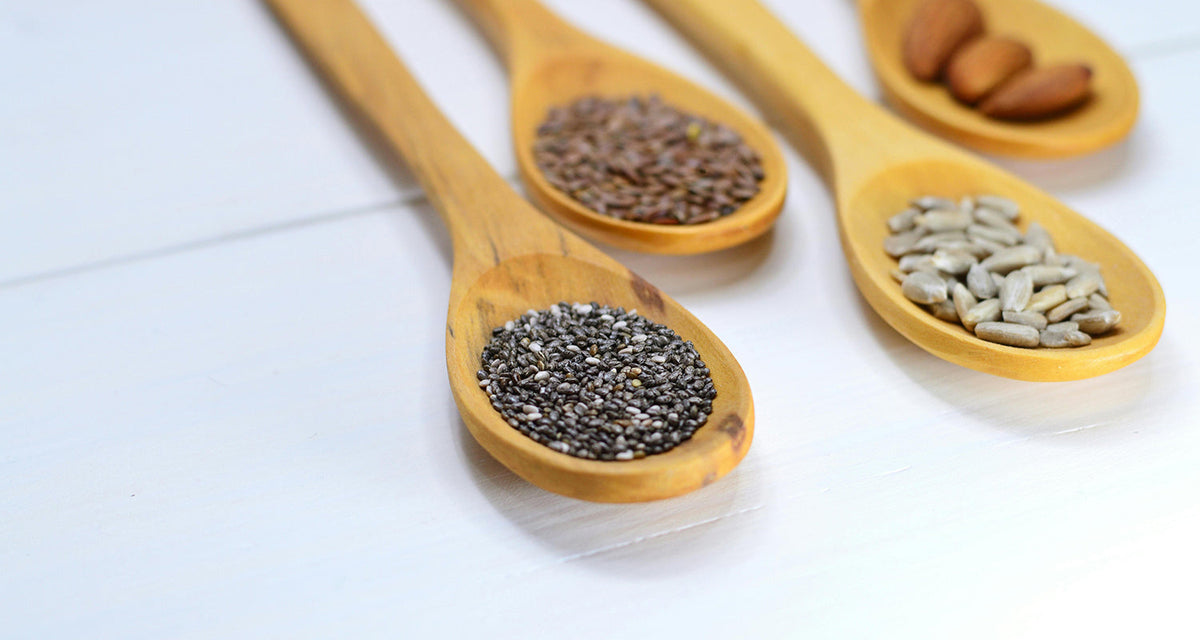
Can dogs eat seeds?
|
|
It's natural for us to want to keep our dogs as healthy and happy as possible. Variety is a key component of a nutritious, healthy diet, so you may want to introduce dog-safe ingredients that provide extra health benefits and keep your dog interested in their meals.
We know that nuts and seeds can be a healthy source of protein, good fats, fibre, and other nutrients for humans, but can dogs eat seeds? In this article, we’ll look at which seeds are safe for dogs, and which are toxic so you can make safe choices.
Pumpkin seeds are generally safe for dogs in moderation or as an occasional treat. They’re not toxic and are a great source of iron, zinc, magnesium, and fatty acids. You can also feed your dog pumpkin, which is safe and provides fibre that aids digestion. However, it’s best not to give your dog too many pumpkin seeds or pumpkin too frequently, as it could cause weight gain or upset your dog’s stomach.
It's safe to feed your dog small amounts of sesame seeds. Since they contain lots of fibre, vitamins B and E, and minerals like iron and calcium, they're a healthy choice. However, remember that your dog's nutritionally complete dog food will contain all the nutrients they need in the right amounts, so anything extra that they have isn't strictly necessary, and might even prevent them from getting the correct levels of nutrients they require.
While chia seeds are a pup-safe superfood, providing fibre, antioxidants, protein, and fatty acids, they can also present a hazard if fed in large quantities. Not only can the high fibre content upset your dog’s tummy, but because chia seeds can swell after consumption, they can occasionally cause an intestinal blockage.
You might enjoy sunflower seeds as a healthy snack, and your dog can too. However, they mustn’t be salted or seasoned. As long as they are plain, they are a dog-safe source of protein, healthy fats, and antioxidants.
You might be starting to think that all the seeds we eat as humans are safe for dogs in small amounts, but that's not the case. Poppy seeds, for example, are toxic to dogs, because they cannot process opiates (alkaloids), meaning they are absorbed and affect the central nervous system, causing neurological symptoms like trembling, wobbliness, incoordination, and drowsiness or sedation. Therefore, it's important never to feed your dog poppy seeds or any other part of a poppy plant.
Pomegranate seeds are full of fibre and high in potassium and antioxidants. Although they're not toxic to dogs, they can sometimes cause an intestinal blockage, because they are hard for your dog's guts to digest. They can also cause an upset stomach, including vomiting and diarrhoea, so it's best to avoid them.
Hemp seeds contain protein, vitamins, and other nutrients to keep things such as your dog’s skin, coat and heart healthy. Hemp seed oil can also be added to dog food for extra nutrients. But remember, your dog's nutritionally complete diet will contain everything they need in the right amounts, so it's best not to tamper with their diet too much by adding little extras, even if they're healthy extras.
As well as the safe seeds mentioned above (not poppy seeds), dogs can also safely eat flaxseeds in moderation. Flaxseeds provide fibre which is great for supporting your dog’s digestive system and promotes regular bowel movements. They are also rich in essential fatty acids, great for keeping your dog’s fur shiny and maintaining their skin health.
Aside from poppy seeds, some other seeds are toxic to dogs. This includes apple seeds, which contain cyanide which is harmful to dogs. It’s generally advised to avoid feeding dogs any seeds, pips or stones that come from fruits as many of them contain cyanide or pose a potential choking hazard.
Before feeding seeds to your dog, check that they are dog-safe, and ensure that you offer them plain, unseasoned, without any extra ingredients. They should also be deshelled to avoid damage to the digestive tract, and to avoid a gut blockage, only feed small amounts.
As with introducing any new food to your dog, it's a good idea to offer a tiny amount first, to make sure they don't react badly. If they have no symptoms of an allergic reaction or upset stomach after a couple of days, you can offer them a little more. Remember, though, 90% of your dog's food intake should be a nutritionally complete diet to give them all the nutrients they need to stay healthy.
Most seeds are safe for your dog to eat in small amounts, although you should definitely avoid poppy and apple seeds. Safe seeds contain nutrients like protein, fatty acids, antioxidants, and other vitamins and minerals, meaning they could give your dog's health a boost. That's why all of our dog meals at Years contain 5.5 – 7% super seeds to help provide the essential nutrients your dog needs.
About the author
